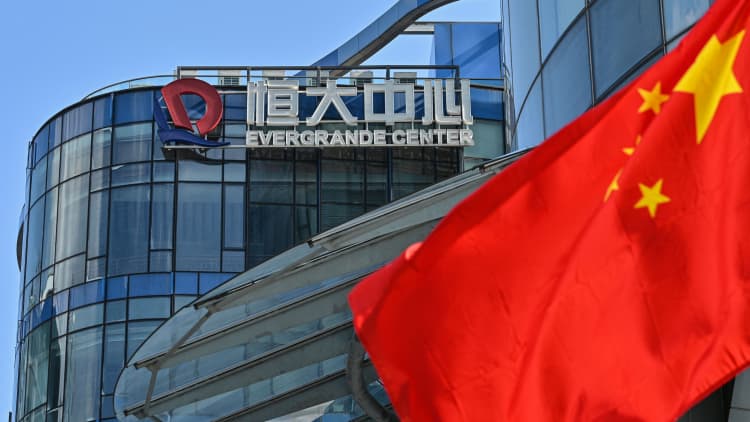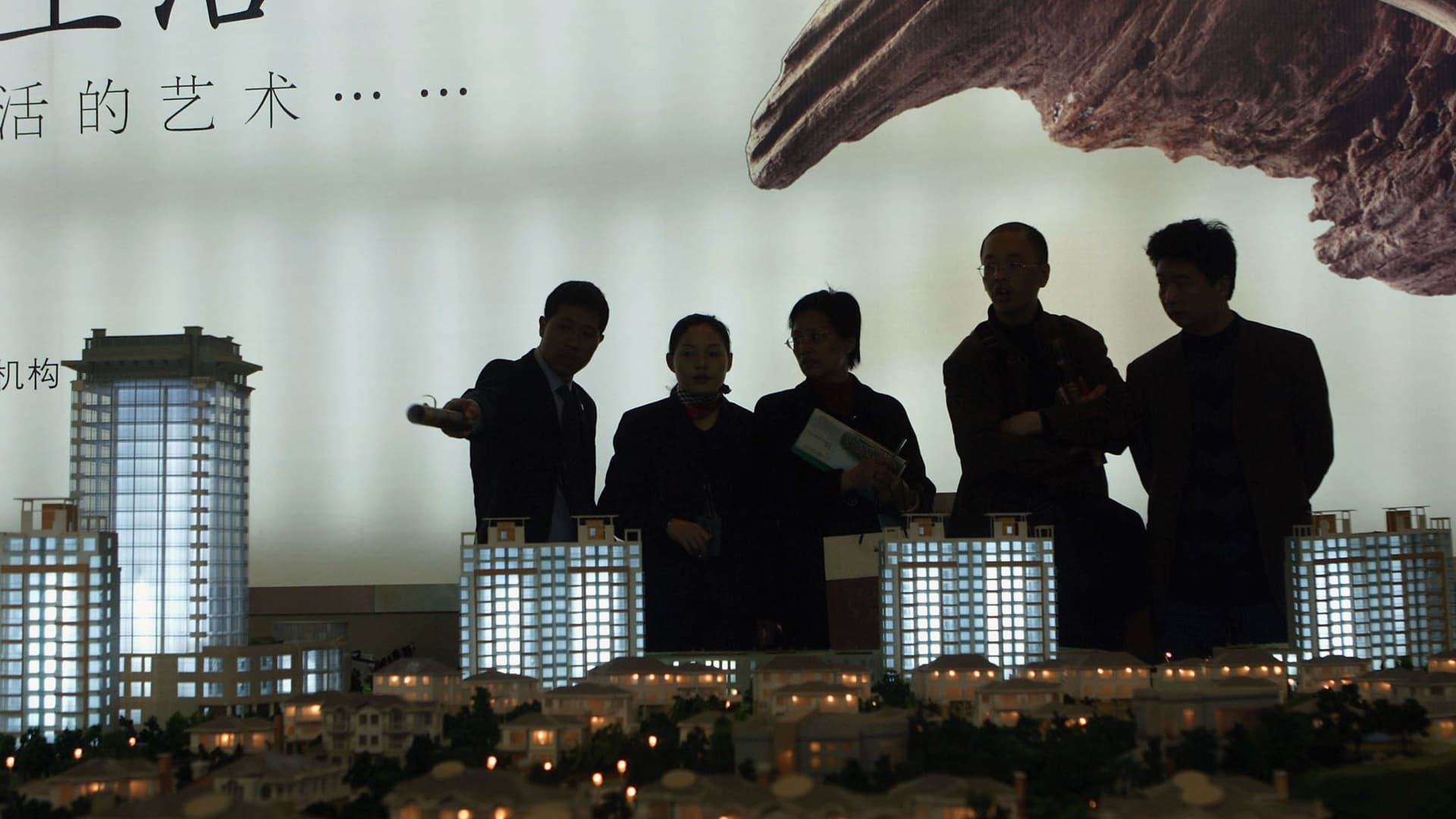Pictured here are models of a real estate development in 2005 in Shanghai, as China’s property boom was gathering steam.
China Photos | Getty Images News | Getty Images
BEIJING — China’s real estate problems have again drawn attention to the world of shadow banking and the risks it poses to the economy.
Shadow banking — a term coined in the U.S. in 2007 — refers to financial services offered outside the formal banking system, which is highly regulated.
In contrast, shadow bank institutions can lend money to more entities with greater ease, but those loans aren’t backstopped in the same way a traditional bank’s are. That means sudden and widespread demand for payment can have a domino effect.
On top of that, limited regulatory oversight of shadow banking makes it hard to know the actual scale of debt – and risk to the economy.
In China, the government has sought in the last few years to limit the rapid growth of such non-bank debt.
Developers were able to borrow liberally from shadow banks, bypassing limits on borrowing for land purchases.
Logan Wright
Center for Strategic and International Studies
What makes the country’s situation different is the dominance of the state. The largest banks are state-owned, making it harder for non-state-owned businesses to tap traditional banks for financing.
The state-dominated financial system has also meant that until recently, participants borrowed and lent money under the assumption the state would always be there to provide support — an implicit guarantee.
Estimates of the size of shadow banking in China vary widely, but range in the trillions of U.S. dollars.
Shadow banking and real estate
China’s property sector, an estimated one-fourth of the economy, lies at the intersection of shadow banking, local government finances and household assets.
Real estate companies bought land from local governments, which needed the revenue and the economic benefits of regional development. People in China rushed at the opportunity to buy their own home — or speculate on property – as prices skyrocketed over the last two decades.
“Developers were able to borrow liberally from shadow banks, bypassing limits on borrowing for land purchases,” Logan Wright, Center for Strategic and International Studies’ Trustee Chair in Chinese Business and Economics, said in an April report.
“As a result, land prices continued rising, with developers then pushing up housing costs to maintain margins.”
According to Wright, Beijing’s recent restrictions on shadow banking pushed the always aggressive developers to turn to other sources of financing to repay existing shadow bank loans. He noted that meant developers started relying more on pre-sales of apartments to homebuyers — via mortgages — and slowing construction to save costs.
The deleveraging campaign that China’s leadership launched in 2016 to reduce systemic financial risks is the only logical starting point to explain how China’s structural economic slowdown began
Logan Wright
CSIS Trustee Chair in Chinese Business and Economics
Then the government cracked down on developers in earnest in August 2020 by setting limits on debt levels.
After decades of rapid growth, Chinese property giants such as Evergrande and Country Garden have successively struggled to repay debt. Their cash flows have dried up, largely due to falling home sales.
Almost simultaneously, news surfaced about trust fund Zhongrong’s inability to repay investors on some products. The fund had lent money to developers.
Hiding money in trust funds
It’s becoming clear that at least a few of the struggling real estate companies had kept some debt off the books.
“Recent disclosures have raised questions about the lax controls and aggressive accounting practices of developers during the boom years,” S&P Global Ratings said in late August.
This summer, property developer Shimao revealed it owed far more debt than previously disclosed — unbeknownst to its former auditor PricewaterhouseCoopers, the S&P report pointed out. PwC resigned as Shimao’s auditor in March 2022.
“Some of those funds, those hidden debt were provided by the trust companies,” Edward Chan, a director at S&P Global Ratings, told CNBC in a phone interview.
“These trust companies were basically part of the shadow banking system in China.”

Trust funds sell investment products, typically to wealthier households.
As of end March, about 7.4% of trust funds’ value in China was exposed to real estate, the equivalent of about 1.13 trillion yuan ($159.15 billion), according to China Trustee Associations data cited by Nomura.
They estimate the actual level of developers’ borrowings from trust companies is more than three times greater — at 3.8 trillion yuan as of the end of June.
“Some trust products that were invested in the property sector may not have disclosed the actual use of funds or intentionally made this information less transparent to circumvent financial regulations,” the Nomura report said.
Economic consequences
Banks in China also used trust companies to hide the true level of risk on their balance sheets, while making money by lending to restricted borrowers — such as property developers and local governments, said Wright from CSIS.
He estimated shadow banking represented nearly one third of all lending in China from 2012 to 2016 — and that after Beijing’s crackdown on the sector, China’s credit growth was cut in half.
Today, Beijing’s problem is it needs to offset a crackdown on shadow banking and real estate developer debt with other kinds of economic support.
“The deleveraging campaign that China’s leadership launched in 2016 to reduce systemic financial risks is the only logical starting point to explain how China’s structural economic slowdown began,” Wright said.
“China’s economic growth over the next 5 to 10 years will depend upon how successfully and efficiently the financial system can shift its resources away from property-related lending and local government investment projects toward more productive private sector firms,” he said.
“Otherwise, China’s economic growth rates will continue to slow over the next decade to 2 percent or below.”








